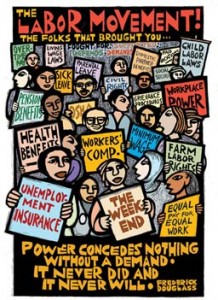Strict Standards: Non-static method Locate_Api_Map::getMetaKey() should not be called statically in /home/uxhbg5d8jpni/public_html/mgwministry/wp-content/themes/churchope/functions.php on line 194
This weekend, most of us are eating left-overs, shopping and watching sports. If you’ve been off since Turkey Day, then you are probably shooting for a four or five day weekend. But where did this idea of the weekend even come from? This past September, Weekend America’s Krissy Clark honored Labor Day by taking us through a brief history of how the weekend came to be.
by Krissy Clark
The extremely short, and mostly right, history of the weekend can be captured on a bumper sticker: “The labor movement. The folks who brought you the weekend.”
Ricardo Levins Morales is an artist and labor activist in Minneapolis. And he, in fact, makes that bumper sticker. He designed it in the early 1980s, in an era when unions were losing favor.
Since then, he’s sold tens of thousands. He says it’s funny to watch people in the rear view mirror squinting with puzzled looks at the stickers. “For people who are not steeped in labor history, it might take a few minutes to figure out what on earth they are talking about.” Because, Morales says, most people think the weekend has always been here, “you know, like the weather.”
It is hard to imagine life without the weekend. But the word didn’t even exist until the 1870s, when Americans were deep into the industrial revolution. “Many working people who were in the factories of the industrial revolution were fresh off the farms, and they were used to regulating their own day, and their own working rhythms,” says Morales. “And here, all of a sudden they’re having to adapt themselves to whistles, to bells, to the clock.”

The men were demanding, as they put it, time for “what we will.”
“The right to have time with our families. To pursue education,” says historian Michael Feldberg. And to go to the zoo, the museum, the church. Actually, getting
Sunday off for worship was relatively easy. Feldberg says, it was Saturday that was the tough part. “If the Jewish Sabbath had been on Wednesday, we would not have a weekend. We would have Wednesday and Sunday off.”
And what kind of weekend is that? Feldberg says even as Americans agitated for more time off, two days off right next to each other was not a foregone conclusion. He says for that, we can thank the massive influx of Jewish immigrants in the late 1800s. They made up a big part of the factory work force. And, Feldberg says, their holy day wasn’t Sunday. “Jews for the most part had to either voluntarily not conduct business on Saturday while the rest of the country did, or abandon their religious principles to make a living, keep a job.”
e federal government didn’t mandate the forty-hour work-week until 1938. Ford pretty much invented weekend road trips, and promoted his own weekend romps in breathless newspaper editorials.
Christian Overland of the Henry Ford museum explains it like this: Ford wanted to sell his Model T. And if people were stuck in factories all week, “when are they going to use it? If your workforce is your consumer, you have to give people the time off to buy the things.” And to take them out on weekend adventures, and drives in the country, and, later, trips to the mall, and little league practice, and all those other weekend errands we’ve come to know and love.
So, who invented the weekend? It was brought to you by the Labor Movement, but also Management. Jews. And Gentiles. And you may as well throw in God, since he came up with the whole “day of rest thing” in the first place.
Source: http://weekendamerica.publicradio.org/display/web/2007/11/24/a_weekend_history_lesson/
